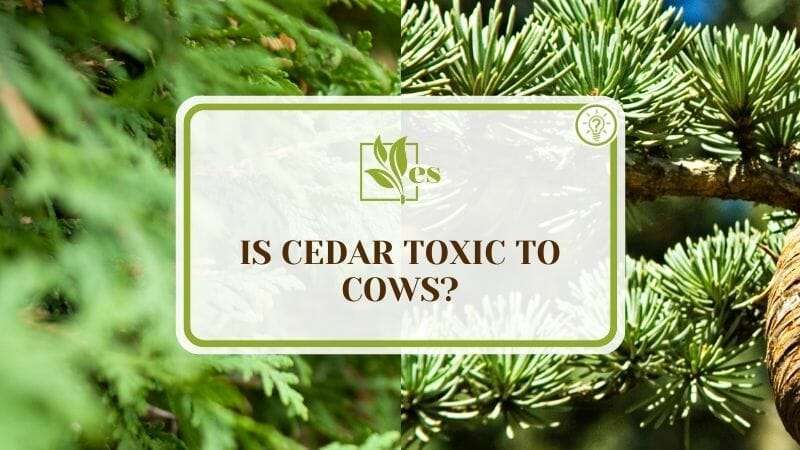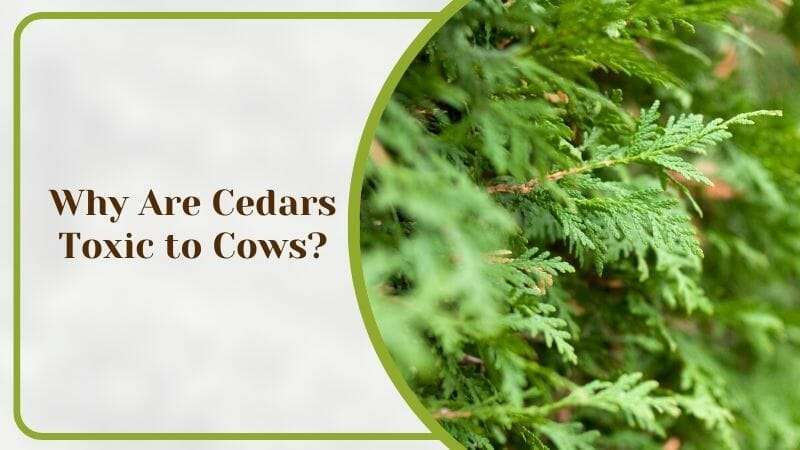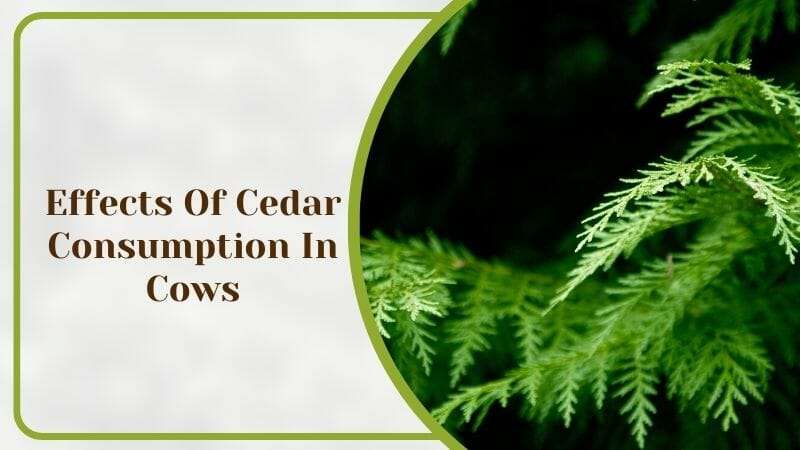
Is cedar toxic to cows? That is probably something that’s been bugging you for a while. According to some ranchers, alarm bells should go off because this arrangement is a recipe for disaster.
Cedar is not only highly invasive but also tends to push other trees out of the pasture, but they are also quite toxic, making it unsafe to burn the wood of some cedar species in enclosed spaces or to prepare food. Read this article as we unpack cedar toxicity for you!
JUMP TO TOPIC
Is Cedar Toxic To Cows?
💥 Yes, cedar is toxic to cows because of this tree contains different types of toxins, such as thujone and Melia toxins A and B, which can result in tremors, muscle contractions, and even death of livestock, are very commonly found in the berries, bark, and leaves of cedar.
Toxins such as Even the smallest amounts of the tree’s leaves may result in diarrhea, colic, and vomiting if ingested. No matter what kind of animals you have, it is always prudent to get rid of any amount of cedar from the property since your pasture or farm should have more healthy trees and fewer hazardous trees.
– Reasons Why Cows Eat Cedar
The reason why cows eat cedars is that the cedars have a full canopy by late spring, the late summer and fall are the times to be concerned about cattle eating tree pieces. The berries of the cedars are ripe at that time and provide the cows with a tasty, albeit poisonous, reward. In addition to the berries, the late spring and summer months could see cows eating the dead cedar twigs and small branches.
Why Are Cedars Toxic to Cows?
There are many types and species of cedar, including white cedar, western red cedar, and eastern red cedar; unfortunately, many of these species are harmful to livestock; thus, you must ensure your cattle do not wander off and start grazing next to cedar.

– Not Edible to Cows
In general, higher levels of cedar intake carry a risk, just like any non-edible plant. However, unless the animals lack access to enough food, it is unlikely to be a problem in a pasture.
– Toxins in Cedars
The berries and the bark of cedar contain significant concentrations of poisonous compounds!
The white cedar and eastern red cedar are particular examples of this. White cedar contains compounds called limonoids or meliatoxins that make it unsafe for cows and some other livestock to consume. The tree also contains two hazardous acids, three toxic resins, and a toxic alkaloid.
Research has discovered that animals fed cedar wood shavings experience liver issues. However, there is also a risk if cows or other animals eat the tree’s leaves or branches.
To be safe, you should assume that every cedar component poisons the animals on your property.
What Are the Effects Of Cedar Consumption In Cows?
The effects of cedar consumption in cows are sickening to the animal, they would cause muscle contraction, tumors, and even lead to a coma in the cow. Furthermore, it would cause skin irritation and the animal would be agitated. Lastly, if it consumes too much, it would be fatal.

– Causing Different Illnesses
Depending on which portions of the cedar the cattle ate and in what quantities, cedars can be harmful to cattle in varying degrees. The symptoms in cattle get worse the more cedar berries and bark they consume. These signs could include tremors, colic, muscle contractions, and, in severe circumstances, death or coma.
The symptoms would be modest if the cattle just ate the leaves where trace quantities of Melia toxins were present. The cattle can vomit, slobber, feel nauseous, or have diarrhea.
– Causing Irritation
Ingesting or staying close to these shavings might result in irritation to the skin and the respiratory system and impaired liver function. It is believed that the compounds included in cedar chips affect a cow’s body.
The animals that have already consumed cedar may experience health issues, but it isn’t always a given that this consumption will lead to death. These cedar chips for example are made from Eastern Red Cedar (Juniperus virginiana) wood, which is toxic to cattle when consumed. It’s also important to remember that cedar chips are only poisonous in large quantities!
– Fatal
Given that it depends on the cow’s size and the cedar’s caliber, there is no conclusive response. A deadly dose, however, is typically accepted to be roughly 0.5 percent of the cow’s body weight.
How To Stop Your Cows From Consuming Cedar?
By keeping your cattle away from regions where cedar grows or providing them with alternate food and water sources, you can stop them from consuming cedar.
– Safeguarding in Cedar-Lined Pastures
The best course of action if there are cedars in your pasture is to remove them and allow grass to take over that priceless space.
If that isn’t an option and you still want to maintain the cedars, you are advised to build mesh wire cages around each tree’s drip line to keep cattle out of the berries and leaves that have fallen to the ground. You can also build some fences around the cedars to prevent cows from eating them, but you should also fill their gaps because the branches might get through them when they grow up.
– Pruning the Dead Branches
To prevent the trees from producing toxic berries, you can also deadhead the low-hanging blossoms in the late spring before pollinating.
If the cedar is still very young, drive over the area with a tractor equipped with a brush hog attachment and remove the cedar trees’ tops.
Use a chainsaw and chop the tree’s bottom green branches for larger trees. For many farmers and landowners, managing cedar is a crucial aspect of land management.
Is There A Cure For Cows Who Ingest Cedar?
For cows who have ingested cedar, there is no recognized cure. Make sure you immediately reach out to your veterinarian if you suspect your cattle may have consumed cedar.
If your cattle eat cedar, the resulting poisoning will cause death in as few days to a few weeks.












